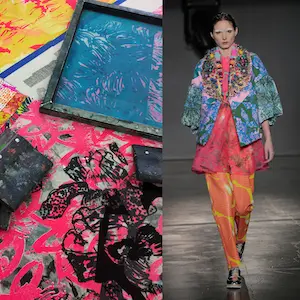Fashion Merchandising (BFA)
Fashion Merchandising (BFA)
The Bachelors of Fine Art in Fashion Merchandising provides a foundation in fashion merchandising and fashion management. It includes major functions necessary to run a successful operation that plans, manages, and sells fashion products. Through hands-on Fashion Merchandising classes in buying, planning, product management, and retail management, students will develop the skills and knowledge required for a successful career in today’s global retail operations.
AA MABachelor of Fine Arts (BFA) Degree
Available Online & On Campus
Core Classes












Unit Requirements
| Major Coursework | Units |
|---|---|
| Core | 36 |
| Major | 30 |
| Electives | 9 |
| Liberal Arts | 45 |
| Total | 120 |
Degree Requirements
BFA FASHION MERCHANDISING DEGREE REQUIREMENTS
- Minimum grade of C- in all major coursework.
- Minimum 2.0 GPA and the following general education requirements:
4 Art Historical Awareness courses
1 Creative Communication course
1 Written Communication: Context & Style course
1 Written Communication: Critical Thinking course
1 Historical Awareness course
1 Cultural Ideas & Influences
1 Employment Communication & Practices
1 Fundamental Math
After above general education requirements are met, take Liberal Arts electives as needed to fulfill the Liberal Arts unit requirement.
Additional Information

Program Learning Outcomes
Undergraduate students will meet the following student performance criteria:
Research and Concept Development
- Conduct thorough market and consumer research using industry-standard research tools and methods
- Identify trends, consumer changes, and market opportunities in the global fashion marketplace
- Analyze research to develop merchandising concepts and applications in contemporary fashion marketing and business marketplace
- Produce creative and original merchandising concepts
- Apply merchandising concepts to advance point of view or concept appropriate for the market changes, target customer, and business types
Fashion Merchandising
- Source, edit and select the appropriate product for a target customer
- Apply merchandising skills and develop product assortments for the selected channels
- Conduct a fashion business analysis and create an effective business plan (sales assortment plan, finances plan and marketing plan)
Technical Skills
- Work effectively with industry standard software to demonstrate and communicate concepts and plans professionally
Presentation Skills
- Create professional visual and written presentations that reflect a point of view consistent with product, target consumer, and brand
- Communicate ideas and merchandising concepts professionally and effectively using fashion industry vocabulary
- Communicate ideas and merchandising concepts professionally and effectively using audience-appropriate visual aids
- Effectively pitch concepts and ideas
- Apply the conventions of standard written English to all professional written communication
Collaboration Skills
- Work effectively in a team
Professional Readiness
- Create a relevant and original portfolio and collateral materials which can be used to market themselves to the industry
Academy of Art University Learning Outcomes
Graduates of the Academy of Art University will demonstrate the ability to:
- Produce a body of work suitable for seeking professional opportunities in their chosen field of art and design.
- Solve creative problems within their field of art and design, including research and synthesis of technical, aesthetic, and conceptual knowledge.
- Communicate their ideas professionally and connect with their intended audience using visual, oral, and written presentation skillsrelevant to their field.
- Execute technical, aesthetic, and conceptual decisions based on an understanding of art and design principles.
- Use professional terminology to evaluate their work and work in the field.
- Recognize the influence of major cultural and aesthetic trends, both historical and contemporary, on art and design products.
- Learn the professional skills and behaviors necessary to compete in the global marketplace for art and design
- Engage with a variety of communities beyond the classroom through internship opportunities, study abroad programs, athletics, student interest clubs, and participation in collaborative, civic, and pro bono projects.
*Semester plans are subject to change at any time. Semester breakdowns displayed are suggested and additional options are available to help customize your educational experience. Speak to an admissions or student services representative for more information. Please see our catalog for more details at: https://catalog.academyart.edu